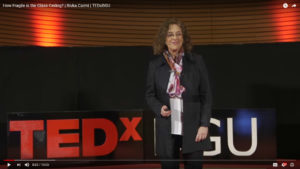
Rivka Carmi on Breaking the Glass Ceiling (TEDx)
Rivka Carmi on Breaking the Glass Ceiling (TEDx)
March 12, 2018
Watch the TEDxBGU video of BGU President Prof. Rivka Carmi, M.D. address feminism, discrimination, success, and the glass ceiling, through the prism of her own impressive career. Watch her TEDx talk >>
A transcript of her talk, “How Fragile Is the Glass Ceiling?” follows:
“Your daughter could study either science or humanities, but I advise her to take humanities since it will be much easier on her,” said my high school teacher to my mother in front of me.
Easier! That was all I needed to hear in order to decide right then and there that I would take science.
The science class was small: about 22 students, of whom just two were girls: Margalit, whose mother was a chemistry teacher, and myself, the daughter of a social worker.
Were we the only two girls who could have taken science? Of course not, but other girls didn’t have a role model-mother like Margalit’s, and they didn’t have my rebellious, ambitious genes.
At 14, I knew that I would be a genetics researcher. I was fascinated by the human cell in which during cell division, pairs of chromosomes exchange parts with each other in order, so said my biology teacher, to increase variability in the world. I was determined to discover the secret behind this amazing explanation.
When at the end of my first year studying biology at the university I decided to switch to medicine, my mother was not happy at all. She maintained that medicine is a very tough profession for a woman raising a family, while biology teachers get vacations that cater to the needs of mothers.
Hearing her, I knew that I had made the right decision.
Still, how many young women continue to make career choices influenced by society’s expectations that give precedence to their “natural” role as wives and mothers?
I didn’t realize that I was a feminist until later on. In fact, at the time, I didn’t even know what feminism was all about. I made my own choices, did what I felt was right for me, and was very involved in teaching, researching and medical academics.
But then, when I was a pediatric resident, I first recognized gender discrimination.
A colleague, more than 10 years older than me, a senior gynecologist and the only woman in her department, shared with me her frustration over not being academically promoted. While much younger and less academically accomplished men were being granted professorships, she was denied again and again with the excuse that her CV was not yet “ripe” for promotion to associate professor.
Just one glance at her CV convinced me that it was more than “ripe” for a full professorship.
I was furious. So I invited myself to a meeting with the chairman of the academic promotion committee, a distinguished professor at the medical school, and presented him with the CV. He promised to take care of it. And nothing happened…
After a month I called him and told him that this was gender discrimination and that I was not going to let the issue go. He warned me: “you are a promising young faculty member, don’t let feminism ruin your career.”
This particular story had a happy ending, with my friend being granted professorship in a record time, and with my realization that I was a feminist.
I was the same person striving for equality – equal opportunity, equal rights – but I learned that apparently when you ask for those rights to be given to the half of humanity that are women, you are a feminist.
If being a feminist means becoming acutely aware of the numerous obstacles, physical and emotional, that women encounter throughout their careers, then indeed, I have become a passionate feminist. Not the kind that burns bras, but nevertheless, one that is committed to equality of women wherever they are and especially in academia and in medicine.
So I was a pediatrician, a neonatologist and a medical geneticist with a genetic syndrome to her name, a full professor, but when I dared run for the deanship of the faculty of medicine against three male candidates, I was, first of all, a woman, whose skirts, said one very senior professor, were too short, hinting that I was not fit for the job. And yes, believe it or not, he said that I had slept my way through the right beds in order to get to where I was.
I’ll bet that more than just a few of you have heard this saying about successful women.
I made it to the deanship after a fierce campaign, where, against colleagues’ advice, I put women’s promotion on my 10 items vision document for the position.
Because if you are a woman who has made it to the top, you have to be totally committed to the cause of women’s equality, and you must, on top of all the obligations and worries that come with the job, constantly work to pave the way, by any means possible, for your fellow women.
You should provide a role model, but also work extra hard to make sure that women get equal opportunities, and experience a women-friendly environment that acknowledges the obstacles they face and the needs they present, on their way to fully realizing their potential.
Because this still cannot be taken for granted: In the male-dominated world, and especially in academia and medicine, women who have “made it” need to take the lead and change the rules.
A year into my time as University president, I met with the head of the Planning and Budgeting Committee of the Council of Higher Education. I asked him to address the issue of the small percentage of women faculty in academia, especially in the higher academic ranks, in face of their equal representation in the undergraduate and graduate student body.
He asked me in return whether I thought that we had already solved all the pressing issues of higher education in Israel. I said no, but that this was certainly one of them. His smile was a mixture of empathy and pity.
So, I waited till it was my turn to head the Committee of University Presidents in Israel. In that capacity, I could no longer be ignored. The issue of women’s promotion in higher education was set as a long-term goal of the Council for Higher Education, with various programs to be implemented and goals to be achieved and, what is even more important, an item on every university’s operating budget, making this a legitimate subject to address and act upon.
With all that had been achieved in the modern world: landing on the moon, cracking the genetic code, the computer, the cell phone, AI ‒ you name it ‒ women’s inequality remains the unintentional reality.
It has been calculated that it would take another 38 years to reach gender equality in an evolutionary fashion.
Can we allow the world to deprive itself for that long from enjoying the immense contribution of women’s talents to every field and aspect of life?
The answer, from both women and men, should be an unequivocal no, but the Sisyphean task of always keeping the subject on the agenda is the special responsibility of women who have made it to the top.




